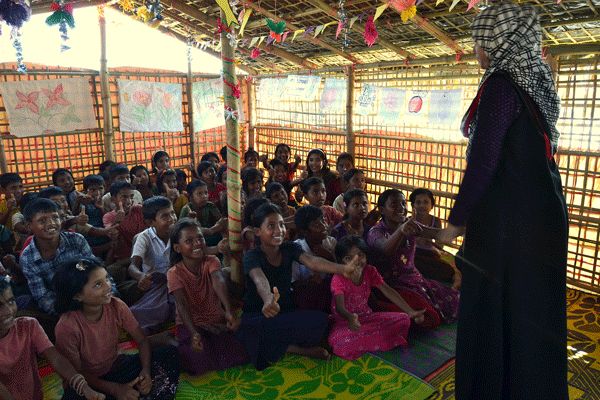The United Nations has designated June 20 as World Refugee Day. Although worldwide estimates vary, the United Nations High Commission on Refugees reports that in 2015, the average length of displacement reached 26 years. This extended relocation requires a response that provides immediate, lifesaving aid in the wake of crises, as well as long-term support for those uprooted. As global crises result in increasingly prolonged displacement, we at the Conrad N. Hilton Foundation have adapted our approach to address the needs of refugees and displaced persons at each stage of their journey.
Prioritizing At-Risk Populations
In the immediate aftermath of a crisis or disaster, it is imperative to identify and support particularly at-risk populations. The inevitable stressors that come with displacement can exacerbate existing vulnerabilities for certain groups, such as the elderly, disabled, women and girls and children.
In the fall of 2017, as more than 600,000 Rohingya refugees streamed into Cox’s Bazar, Bangladesh, the Hilton Foundation recognized that the children, who accounted for approximately 54 percent of this group, would require special protection and services. Already marginalized prior to their traumatic journey, these children found themselves living in makeshift settlements with no access to safe classrooms, making them vulnerable targets for human traffickers. Partnering with BRAC, a Bangladesh-based organization, we funded safe spaces that would not only provide protection from human trafficking, but offer psycho-social support, critical services for parents and much-needed continuing education.

Ongoing Support
As the length of displacement may last years, we must ensure that those impacted continue to receive needed services. Many host countries struggle to meet the demands of large refugee populations, and support from multilaterals, non-governmental organizations and philanthropy can be critical.
The Syrian refugee crisis, now in its seventh year, has resulted in an estimated five million people fleeing their homes, mostly to neighboring countries. In Lebanon, roughly half of the 500,000 school-aged Syrian children were not enrolled in 2016. In response, the Foundation partnered with Save the Children to develop a country-wide educational strategy to ensure that all deprived children receive quality, inclusive basic education. Through a combination of the Basic Literacy Numeracy Learning Centers and Homework Support Groups, the program supports children and their families where they are, both physically and developmentally. In Turkey, which hosts more than two million Syrian refugees, the Hilton Foundation has partnered with Theirworld to scale access to primary education and early childhood development for Syrian children. It has done so by working on the ground to pilot new educational models, but also at a global scale, by creating a narrative to advocate for additional support.
Resettlement Assistance
If refugees are given the opportunity to resettle in another country, they often need additional support to integrate, become financially stable and manage the trauma they have experienced. While less than one percent of all refugees around the world are resettled in a third country, those who are become some of the most vulnerable members of the population.
In the United States, although current resettlement is on the decline, there are many individuals who can benefit from ongoing support. For example, The Center for Victims of Torture found that over 40 percent of refugees are estimated to have experienced some form of torture. To aid these populations, the Foundation partnered with the International Rescue Committee across four cities: Boise, Idaho; Dallas, Texas; San Diego, California; and Elizabeth, New Jersey. Working with local communities, the program provided integrated legal and mental health services for refugees and immigrants. Through this process, they also trained community advocates to connect participants with much-needed mental health resources.
On World Refugee Day, we at the Hilton Foundation are taking this time reflect on how we can best support the global community during this era of dislocation. As we consider the different stages of displacement across the world, it is important that those in the philanthropic community, and our partners, consider how we can best meet people where they are – not only physically, but also in terms of their individualized needs.